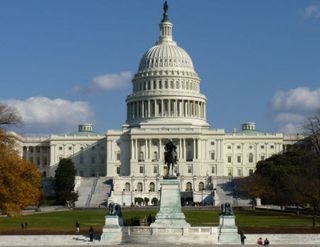Senate Dems Vow to Fight for Open Internet Order on All Fronts

Democratic Senators joined with representatives of net-neutrality activists Free Press and Fight for the Future to pledge war against any effort by FCC chairman Ajit Pai to reverse the common-carrier classification of ISPs.
That came at a press conference Wednesday morning (April 26) held by Sens. Ed Markey (D-Mass.), Richard Blumenthal (D-Conn.) and Ron Wyden (D-Ore.), three of the most passionate defenders of the FCC's Title II Order, in advance of FCC chairman Ajit Pai's speech on the future of net-neutrality regulation at an event at the Newseum in Washington hosted by FreedomWorks and the Small Business & Entrepreneurship (SBE) Council.
Related:Sen. Schatz Meets With NCTA, Others on Open Internet Order
Also on the call were Craig Aaron of Free Press and Evan Greer of Fight for the Future.
As he has before, Markey said chairman Pai should expect a tsunami of resistance to any such proposal.
Unlike the Republicans' ability to push through a repeal of the related broadband privacy framework, the participants argued, to roll back the FCC's Open Internet order will take time, time they can use to their advantage.
Blumenthal and others pointed out that to reverse Title II, the FCC would have to demonstrate to the court, which upheld the reclassification, that something major and material had changed, which would take time to build a record, and have that record commented on.
They vowed to use that time to mobilize that "tsunami" of consumer opposition, which has so far been a trickle if the FCC's accounting of most active dockets over the past 30 days is any example -- only 69 comments.
They also suggested the Trump Administration had miscalculated its base, which they said did not want big cable companies, which already charge too much for service, deciding where they could go on the Web and what they could do.
One way to delay the rollback would be for FCC commissioner Mignon Clyburn not to vote such a proposal, which would deny the Republicans the quorum they needed to proceed, but neither Markey nor Blumenthal, who weighed in, said they would advise Clyburn to take such action, or inaction as it were, saying that was up to her. Markey did say he would talk to Clyburn, who is the only remaining commissioner who voted for the Open Internet order.
Related:Clyburn Will Make Hill Plea for Open Internet Order
"She is in the middle of the battle herslef, and it is a tough choice, but I am sure she is going to make the right judgmentBlumenthal said. "I will talk to her about what is the best course of action, but I don't want to prejudge it."
Blumenthal said not voting was only one part of a potential strategy, a strategy that "utilizes public opinion, that reaches out to the chairman and the commission," adding that it was obviously her decision.
The language tended toward the extreme on the call, with Blumenthal saying the Trump Administration was trying to kill a vital part of the Internet, the openness that was the heritage and DNA of the "net, and destroy the basic protections of no blocking and throttling and paid prioritization.
He also talked about the speech implications, saying allowing blocking or discrimination threatened the public square soapbox the 'net had become.
Blumenthal outlined their plan of attack, which included to "galvanize the seismic outcry that should follow this kind of misguided effort, and oppose the rollback in committee, on the Senate floor and in the courts.
Asked if Pai's plan could prompt some Democrats to come to the table on a possible legislative fix to secure basic protections outside of Title II classification, Markey said there was nothing wrong that needed fixing and he was focused on stopping Pai. He also suggested any compromise bill would lack sufficient protections.
Last time around, when a massive campaign helped move the Open Internet needle toward Title II, Fight for the Future generated calls to Congress and comments to the FCC and even camped out outside the FCC in protest. Greer warned the same could happen this time around: "Hell hath no fury like the Internet scorned," he said.
Multichannel Newsletter
The smarter way to stay on top of the multichannel video marketplace. Sign up below.
Contributing editor John Eggerton has been an editor and/or writer on media regulation, legislation and policy for over four decades, including covering the FCC, FTC, Congress, the major media trade associations, and the federal courts. In addition to Multichannel News and Broadcasting + Cable, his work has appeared in Radio World, TV Technology, TV Fax, This Week in Consumer Electronics, Variety and the Encyclopedia Britannica.

